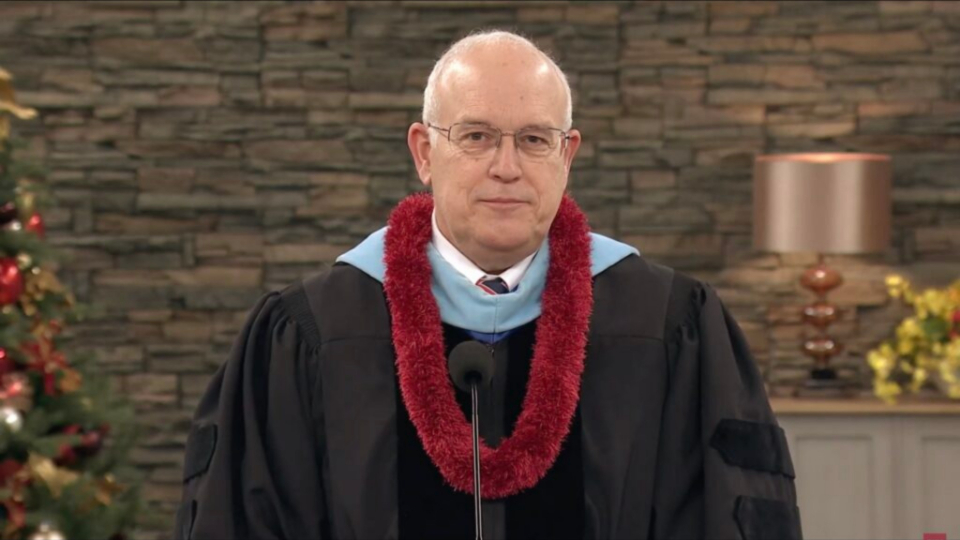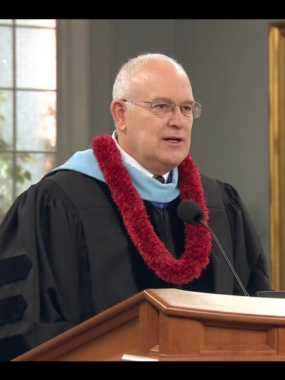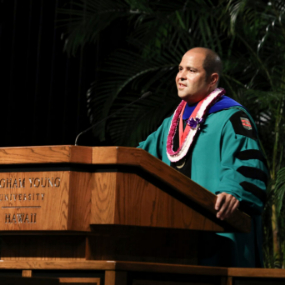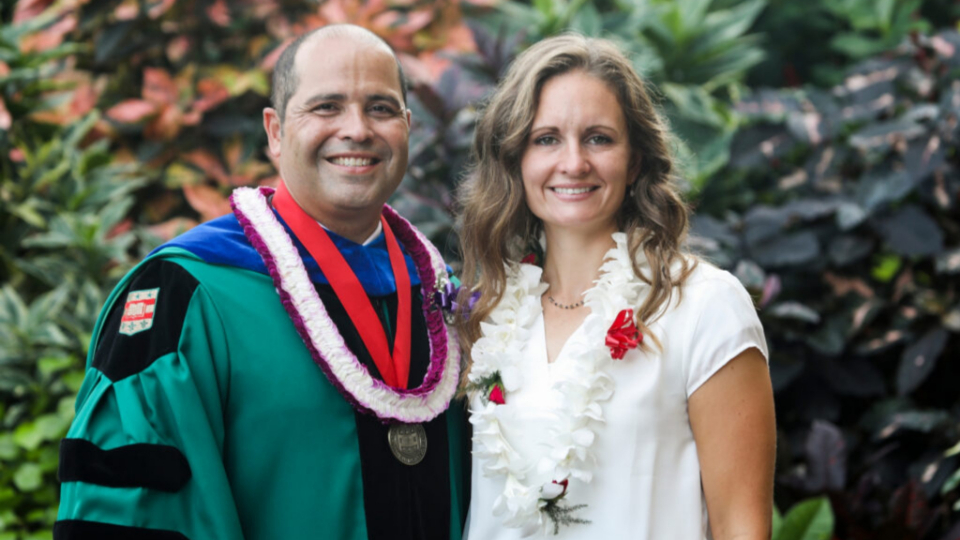
Johnson BYU-H
Elder Paul V. Johnson, Commissioner of Education for the Church, speaks in the virtual commencement exercises for BYU-Hawaii on Friday, December 11, 2020. Photo is a screenshot from the broadcast on byuh.edu. 2020 by Intellectual Reserve, Inc. All rights reserved.This story appears here courtesy of TheChurchNews.com. It is not for use by other media.
By Rachel Sterzer Gibson, Church News
In offering congratulations to BYU–Hawaii’s newest graduates on December 11, Elder Paul V. Johnson, the Church’s Commissioner of Education, acknowledged that their commencement exercises — and their last semester — were probably much different than what they had envisioned.
For one thing, students did not gather or study on the North Shore campus on the island of Oahu for their final semester. BYU–Hawaii announced on June 11 that the fall semester would be online only due to precautions over the spread of the coronavirus.
And instead featuring students in caps, gowns and leis and walking in a processional, Friday’s commencement services were also conducted strictly online. Elder Dale G. Renlund of the Quorum of the Twelve Apostles had originally been slated to speak at the fall 2020 commencement exercises, but due to his recent COVID-19 diagnosis, he was replaced as a speaker by Elder Johnson.
“Who would have predicted the conditions we find ourselves in for this commencement?” Elder Johnson asked. “Who would have thought that the last part of your education here would be done remotely?”
In his remarks during commencement, BYU–Hawaii President John S.K. Kauwe III expressed his disappointment in not being able to greet the 240 graduating students in person. “It pains me that the university community is not together right now, sharing leis, hugs and kisses and throwing shakas and big smiles,” he said.

Johnson BYU-H
Elder Paul V. Johnson, Commissioner of Education for the Church, speaks in the virtual commencement exercises for BYU-Hawaii on Friday, December 11, 2020. Photo is a screenshot from the broadcast on byuh.edu. 2020 by Intellectual Reserve, Inc. All rights reserved.Despite the surprising and challenging year, Elder Johnson told graduates they should celebrate their remarkable accomplishment. “You have a bright future ahead of you, despite the current challenges in the world,” he assured them.
Each generation faces its own set of trials, Elder Johnson noted. His grandparents were young adults during World War I and the Spanish flu pandemic. His parents grew up during the Great Depression and were college-aged during World War II.
His own generation grew up in the time of the Cold War, Vietnam War and the rise of the drug culture, while his children saw the terrorism of September 11, 2001, and the knowledge-explosion brought on by the expansion of the internet.
The current generation departs BYU–Hawaii “in a time of pandemic, a polarization of society and the far-reaching positive and negative effects of the social media flood,” Elder Johnson said.
Despite generational and personal trials, individuals from past generations were able to do what the Lord wanted them to do. “You will, too,” Elder Johnson said. “The faithful who went before you did not shrink from nor shirk their responsibilities. You will not either.”
Nephi in the Book of Mormon was commanded to build a ship, something he did not know how to do, but he sought the guidance of the Lord.
“Like Nephi, if you will seek, the Lord will show you ‘from time to time after what manner’ you should work the timbers of your life. It will be different than ‘the manner of men’ (1 Nephi 18:1–3),” he said. “And along the way, He will show you great things. He will help you get through whatever wilderness and over whatever seas separate you from your promised land.”
Elder Johnson then spoke of President Kauwe, who was appointed as president of the Church’s university in the Pacific earlier this year, in the midst of the pandemic. President and Sister Kauwe “have gone forward with faith, have had the Lord show them how to work a few timbers, and have received direction and revelation for them and for the university.”
Like the Jaredites and the Kauwes, as individuals commend themselves to the Lord, the wind, the waves and the storms of life will blow their vessels toward the promised land (Ether 6:4–10), Elder Johnson promised.

Johnson-BYU-H
BYU–Hawaii President John K.S. Kauwe III speaks during BYU–Hawaii’s online commencement exercises on Friday, December 11, 2020. Photo by Monique Saenz, BYU–Hawaii. Photo Courtesy of Church NewsElder Johnson then spoke of his four grandsons who are currently serving missions.
Three of them have had a parent die, and one is a cancer survivor. Each has faced difficult trials and is now serving in a very different situation than past years. “Like most of us in the midst of challenges, they are finding joy, inspiration and help in their work,” he said.
Elder Johnson’s grandson Steven was diagnosed with bone cancer 10 years ago and had a leg amputated. He recently wrote from his mission, “Dealing with a changing world is tough. … But when we have a rock-solid foundation built on our faith, even the uncomfortable things become comfortable. And we can move forward with hope that the unexpected will be fun, that God will still be with us no matter the circumstances, and above all, with hope that no goodbye is forever. That is the hope Christ brings; I am so happy to believe in Him with [Who[m] eventually every ending ends up excellent.”
Elder Johnson recognized that many of his listeners might be facing uncertainty with employment or their next steps in life.
“Although we deal with uncertainty in certain aspects of life, we have promises that are sure. We cannot allow uncertain prospects to shake us from the certain promises of the Lord.”
The Lord wants to help, build, strengthen and inspire individuals, Elder Johnson said. Satan wants to frighten, discourage and keep individuals from fulfilling his or her eternal destiny.
Satan makes good use of the great and spacious building, Elder Johnson noted. “Mocking, scoffing and pointing fingers can be very influential.” If individuals pay heed to the mockers, they will lose sight of the tree and the fruit that is “desirable above all other fruit” (1 Nephi 8:12).
Those who live their covenants cut down on the worldly noise in their lives. “Small and simple acts bring great blessings. Simple can be profound. Quiet can be powerful. Small can be life-changing.”
Elder Johnson told graduates to “go forward with faith. I know that not only can you survive the challenges and trials you face, but you can thrive. I know this because I have a small sense for the power of God and know of the sureness of His promises. Those promises are yours by covenant, and no one can take them away. They are lost only if we turn from our covenants and fail to repent.”
President Kauwe said his 2020, like that of the graduates, has looked nothing like he expected. He offered a few things he has learned in responding to these challenging times.

Johnson-BYU-H
President John “Keoni” S.K. Kauwe III, with his wife, Monica Mortenson Kauwe, pose for a photo prior to BYU–Hawaii’s fall commencement exercises on December 11, 2020. Photo courtesy of Monique Saenz, BYU–Hawaii. Photo Courtesy of Church NewsFirst, remember it is OK to feel sad, frustrated and disappointed.
“It is OK to feel grief. It is OK to cry,” he assured graduates.
President Kauwe discovered the second lesson from a Church News column written by DMC Executive Vice President Sheri Dew about the loss of her mother. “I’m coming to realize that grieving is a kind of enhanced gratitude,” she wrote.
President Kauwe, who also lost his father this year, said, “Grief over the relationships, conditions and opportunities lost in this challenging year is a manifestation of the gratitude we have for those things.
“When we are able to connect that grief to gratitude, we can change our perspective on the challenges we are facing.”
Third, see the opportunity in the challenges.
President Kauwe quoted President Thomas S. Monson: “Difficulties allow us to change for the better, to rebuild our lives in the way our Heavenly Father teaches us. It also allows us to become something different from what we were — better than we were, more understanding than we were, more empathetic than we were, with stronger testimonies than we had before.”
As a result of their time at BYU–Hawaii and the unique challenges they have faced, graduates have become — as the university’s mission states — “leaders with character and integrity,” President Kauwe said.
Copyright 2020 Deseret News Publishing Company